by
R. Green
Takfir is a key issue, since, in Islam, heresy is punishable by death. Hence takfir constitutes religious license to target and kill an individual.
Introduction
Even as the Islamic State (ISIS) is
involved in fierce battles in Iraq and Syria, its official organs,
clerics and supporters are engaged in an intense internal dispute over
issues of theology. There are indications that the top ISIS leadership
has adopted a new and even stricter view on the issue of takfir –
accusing fellow Muslims of heresy or unbelief – and that senior ISIS
clerics, as well as many ISIS supporters, disapprove of this change. Takfir is a key issue, since, in Islam, heresy is punishable by death. Hence takfir constitutes religious license to target and kill an individual.
The shift was apparent in a memo published
on May 17, 2017 by the organization's top executive council, the
Delegated Committee, which redoubled ISIS's commitment to takfir. The memo asserted that takfir
is a fundamental tenet of Islam, as important, or even more important
than basic obligations such as prayer, and adopted a radical position
regarding the collective status of citizens of Muslim countries, casting
doubt on whether they should be considered true Muslims.
The Delegated Committee also pulled
textbooks on theology from training camps and religious institutes,
apparently in order to correct them and tailor them to the new
theological line. Furthermore, ISIS's official newspaper attacked a late
Al-Qaeda leader who in the past was effusively praised by none other
than ISIS leader Abu Bakr Al-Baghdadi himself, which was seen by ISIS
supporters as another example of the organization's new, tougher line.
The apparent change in the official ISIS position on takfir
drew criticism from ISIS clerics, including from its top mufti. They
slammed the Delegated Committee's memo, noting that the ISIS leadership
was pandering to extremist elements within the organization and
contradicting its previous views. ISIS's online supporters also joined
the fray. Some echoed the clerics' criticism of the Delegated
Committee's memo and its new stance on takfir, even suggesting
that the committee, or the ISIS official media organs, have been
infiltrated by extremists. Others vehemently rejected the criticism,
noting that ISIS members and supporters were duty-bound to submit to the
Delegated Committee and accept its views. They denied the claims of
infiltration and suggested that the critics were traitors and
infiltrators themselves.
One likely catalyst for this shift is the
constant challenge posed to ISIS by a small but strident camp of
hardliners who consider its official ideology insufficiently radical.
Some of these hardliners who left ISIS due to these disagreements have
gone so far as to accuse its leadership, including even Al-Baghdadi, of
heresy. ISIS purged itself of many members of this camp in the past, and
recently there have been reports of a new wave of executions of
extremists.
[1]
However, elements of the camp still exist within ISIS or in its orbit,
and their views seem to have a degree of influence on the organization's
leadership.
This report reviews the current controversy within the movement on the issue of takfir.
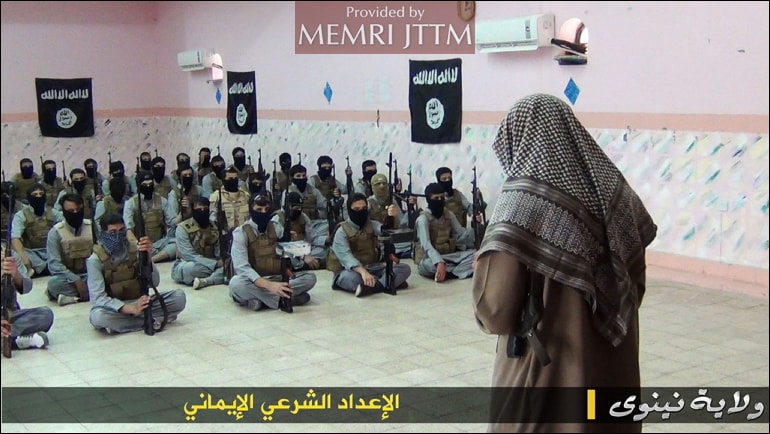 ISIS fighters attending a lesson on religion
ISIS fighters attending a lesson on religion
Background: ISIS And Takfir
The questions as to who is considered a
Muslim and who ought to be excluded from the Islamic fold, and under
which conditions and circumstances, are critical questions for
Salafi-jihadis in general and for ISIS in particular, and are dealt with
extensively. They are fundamental questions for jihadis, since takfir is pivotal to identifying the enemies who must be fought and killed, and to justifying the aggression against them.
The issue of
takfir was one of the
major points of contention in the conflict between Al-Qaeda and ISIS.
Al-Qaeda holds the more moderate position, according to which
takfir
should be reserved for selected individuals, whereas ISIS leaders and
ideologues apply it more freely, and do not hesitate to brand as
heretical entire movements, communities or sects, such as the Shi'ites.
That said, even ISIS has thus far eschewed the most extreme positions,
such as making a blanket accusation of heresy against the citizens of
Islamic countries. In its publications that outline the conditions for
accusing others of heresy and unbelief, ISIS consistently insists that
it takes the middle road between the position of the "extremists," who
apply
takfir excessively, and that of the "postponers" who fail to apply it straight away when it is justified.
[2]
However, some jihadis and ISIS supporters
consider this position too lax. A crucial point of controversy is the
status of Muslims who are not themselves guilty of heresy but who
refrain from denouncing others who are, on the grounds that their
apparent heresy may stem from ignorance of Islam and may therefore be
excusable. The mainstream ISIS position has been that such "refrainers"
should not be targets of takfir, but the radicals within the
movement contest this view. The ongoing friction created by these
theological disputes turned them into a political problem that the
leadership felt it had to address.
One Year Ago: ISIS Religious Oversight Organ Issues Statement In Attempt To End The Disputes Over Takfir
One attempt to quell the controversy was
made more than a year ago, when the Central Office for Monitoring the
Shari'a Bureaus issued a statement – Statement No. 155 from May 29, 2016
– by the director of ISIS's media wing Abu Muhammad Al-Furqan. The
statement reaffirmed ISIS's commitment to the takfir of "polytheists" (i.e., to accusing them of heresy). However, it rejected the application of takfir
to Muslims who are not themselves guilty of heresy but who refrain from
making this accusation against people who are, since this would lead to
an endless chain of takfir. The statement forbade ISIS members
to engage in theological disputes that can lead to accusations of heresy
against fellow members of the organization.
Ideological Dispute Reignited
However, the Central Office's statement
was not sufficient to end the ideological dispute within the
organization. Therefore, the Delegated Committee – a higher authority,
second only to the "Caliph" himself – stepped into the fray, apparently
with Al-Baghdadi's blessing, and issued the memo that sparked the latest
round of controversy.
[3]
Al-Baghdadi's Letter To The Delegated Committee
In late April, 2017, shortly before the
issuing of the memo, Al-Baghdadi addressed a letter to the Delegated
Committee in which he provided general guidance and exhorted the
committee members to carry out their duties in good faith (for a full
translation of the letter, see Appendix III). In the letter, which was
distributed to all the ISIS provinces, Al-Baghdadi wrote to the
Delegated Committee: "We have entrusted you with the great task and
responsibility of establishing the religion and of protecting the
Muslims and caring for them. In this you are deputies of the Caliph,
each of you according to the position he was appointed to and entrusted
with."
[4]
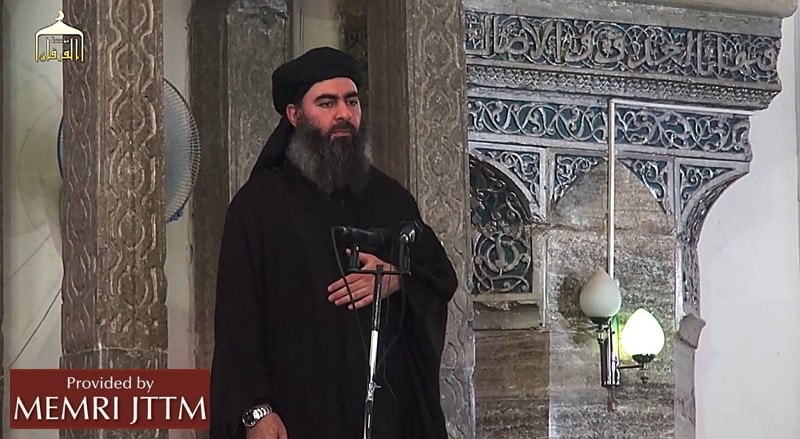 ISIS leader Abu Bakr Al-Baghdadi
ISIS leader Abu Bakr Al-Baghdadi
Some ISIS supporters see this letter as
proof that Al-Baghdadi gave the Delegated Committee a carte blanche to
revise ISIS's ideological positions. Clearly, whoever leaked it to the
online forums of ISIS supporters did so with the intention of proving
that any step by the Delegated Committee had been taken with
Al-Baghdadi's approval and blessing.
[5]
Delegated Committee Releases Memo Reflecting New Stance
On May 17, 2017, ISIS's Delegated Committee published the aforementioned memo setting out its new stance on
takfir, titled "That Those Who Perish Would Perish upon Proof and Those Who Live Would Live upon Proof"
[6] (for excerpts from the memo, see Appendix II). A condensed version of the memo was published in Arabic in ISIS's weekly
Al-Naba and translations of this condensed version appeared in its
Rumiyah magazine. The version in
Al-Naba
stressed that the document reflected the views of the ISIS leadership,
calling it "an important memo from the Delegated Committee on behalf of
the Commander of the Faithful [Al-Baghdadi]."
[7]
The memo was meant to clarify once and for all ISIS's official stance on takfir. As Al-Naba
put it, "The memo completes a series of memos and statements by the
Delegated Committee and its Central Office for Monitoring the Shari'a
Bureaus aimed at settling controversies over the Islamic State's creed
and methodology."
As usual in ISIS statements, the document
stressed that ISIS takes the middle road between leniency and extremism
in the application of takfir. Nevertheless, certain parts of it appear to reflect a tightening of the position on takfir by making it a central pillar of ISIS's creed.
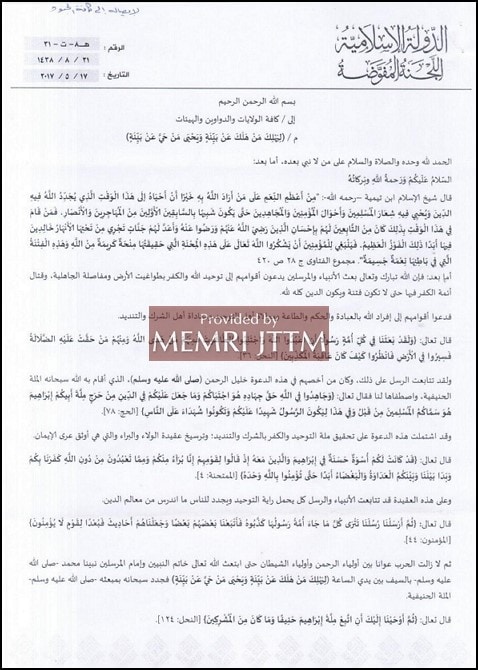 The Delegated Committee's memo on takfir
The Delegated Committee's memo on takfir
The seven-page memo, addressed to "All
provinces, departments and authorities," outlines two camps that differ
from ISIS in their view on takfir:
-
The camp of "irja (postponement)" or "murjia" (those who postpone), whose members refrain from directing accusations of heresy at those whom ISIS deems guilty of it.
-
The camp of "ghuluw" (extremism), whose members falsely accuse
ISIS of laxity in the application of the shari'a, of espousing an
unsound religious creed and of diffidence in pronouncing takfir.
The memo then denounces the "camp of
postponement" in very explicit terms, stating: "Everyone knows that the
Islamic State has not hesitated for a single day to acknowledge the
heresy of polytheists, and that it regards this issue to be one of the
clear principles of the religion, which must be known [to a Muslim even]
before he knows [the rules of] prayer and other religious obligations
that are necessarily known..."
Even more noteworthy is a passage in which
ISIS clarifies its opinion on the citizens of Islamic countries,
countering the charge made by the extremist stream that it views them as
Muslims. The memo states this is a "lie" and "slander" against ISIS,
implying that it views the Sunni citizens of Islamic countries as
apostates or infidels, a very extreme position.
At the same time, a considerable part of
the memo is dedicated to denouncing the extremist camp, especially ISIS
members who left the organization because it did not live up to their
religious standards, castigating them as deserters and as insubordinate.
Further Indications Of ISIS Leadership's Increasing Extremism
Another indication of the shift in ISIS's official stance on
takfir
was a directive issued by the Delegated Committee instructing religious
officials to remove several textbooks that were used to teach basic
theology to new ISIS recruits in the organization's training camps. The
move is especially noteworthy as the books, published by ISIS's
Department of Da'wa and Mosques or by its Office of Studies and
Research, were used to teach thousands of fighters in the past years,
and at least one of them is said to be by Abu 'Ali Al-Anbari, a former
deputy of Al-Baghdadi and a fire-breathing ideologue himself, who was
killed in 2016.
[8]
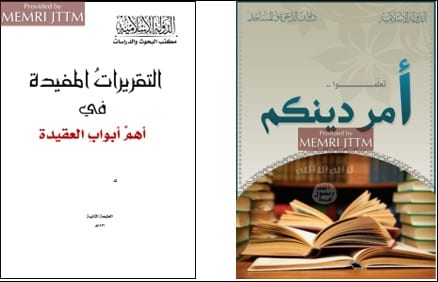 Two of the books removed under the Delegated Committee's directive
Two of the books removed under the Delegated Committee's directive
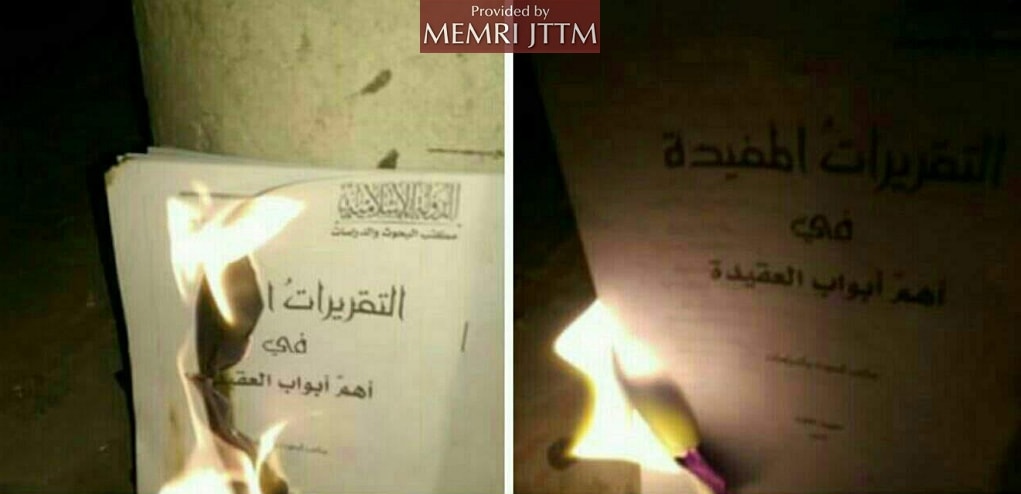 Extremists burned copies of the banned books in celebration of the Delegated Committee's directive to remove them
Extremists burned copies of the banned books in celebration of the Delegated Committee's directive to remove them
A further indication appeared in an article in the organization's official weekly
Al-Naba,
the sixth installment in a series titled "Symbols or Idols?", dedicated
to a polemic with ISIS's ideological rivals such as the Muslim
Brotherhood, Al-Qaeda and the Taliban. The article, which caused a stir
among ISIS supporters, slammed the slain senior Al-Qaeda leader
Atiyyatallah Al-Libi, calling him one of the "imams of misguidance and
heads of
fitna."
[9]
This, despite the fact that Al-Baghdadi previously praised him as "the
scholar who practiced his knowledge, the jihad warrior... the man of
knowledge and dignity."
[10]
This verbal attack on an Al-Qaeda leader in ISIS's official mouthpiece
indicates that the organization is trying to distance itself from
Al-Qaeda and highlight the ideological differences between the two
organizations. Furthermore, it was meant to show that ISIS has no qualms
about denouncing Al-Qaeda leaders as unbelievers, in accordance with
the principle of
takfir against the polytheists.
 Atiyyatallah Al-Libi (left) alongside Muslim Brotherhood founder Hassan Al-Bana, on the cover of the ISIS weekly
Atiyyatallah Al-Libi (left) alongside Muslim Brotherhood founder Hassan Al-Bana, on the cover of the ISIS weekly Al-Naba
Top ISIS Clerics Denounce The Delegated Committee's Memo
The Delegated Committee's memo sparked
controversy among ISIS followers and scholars. The most important
criticism came from senior ISIS cleric Turki Al-Bin'ali, who was killed
shortly after the publication of the memo
[11]
but not before he penned a letter to the Delegated Committee expressing
his strong objection to it (for excerpts from the letter, see Appendix
II). According to some, his letter reflected the opinion of ISIS's Fatwa
Department. It should be mentioned that Al-Bin'ali provided the
religious sanction for the purge of extremist ISIS members in the summer
of 2014.
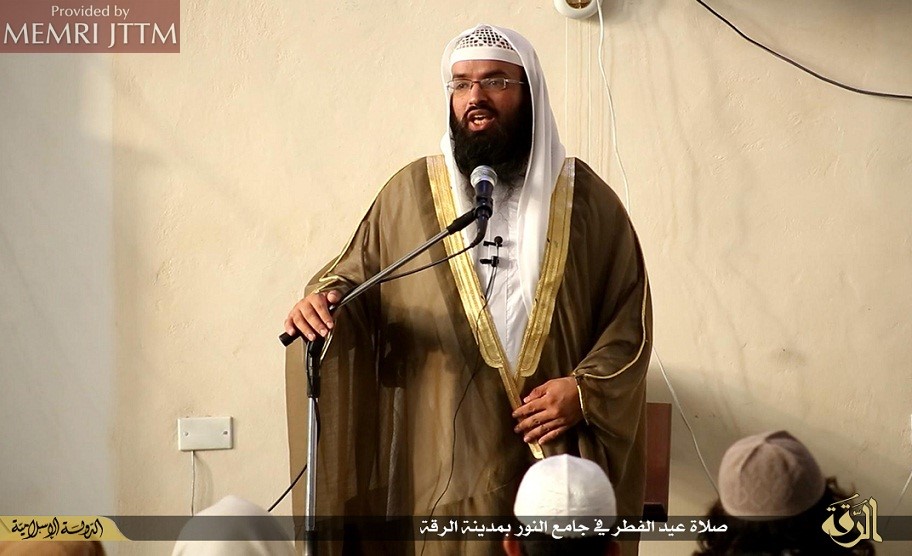 Turki Al-Bin'ali delivering a sermon in Raqqa, July 2015
Turki Al-Bin'ali delivering a sermon in Raqqa, July 2015
The letter was apparently meant for the
eyes of the Delegated Committee only, not for the general public. Since
it is unsigned and bears no official logo, many ISIS supporters have
questioned its authorship, but there are indications that it was indeed
written by Al-Bin'ali. In the letter Al-Bin'ali complained that neither
he nor other senior religious officials had been consulted about the new
positions or shown a draft of the memo. He also expressed dismay over
the fact that "extremists" were touting the memo as a victory and as
vindication of their views.
However, his main reservation was that the memo espoused the radical view that
takfir
is "one of the clear principles of the religion." This phrase, he
explained, contradicts the text of the Central Office's May 29, 2016
statement, which said that the
takfir of some of the polytheists
who regard themselves as Muslims is an issue that has "fallen into
obscurity" (i.e., was clearly understood by Muslims in the past, but
today is unclear to some of them). The latter language provides some
leeway regarding Muslims who are not themselves guilty of heresy but who
fail to brand others as such, implying that their reluctance may stem
from an incomplete understanding of the laws of
takfir and may thus be excusable. The position in the memo, on the other hand, obligates ISIS to apply
takfir against all these Muslims, thus precipitating an endless chain of
takfir, argues Al-Bin'ali.
[12]
Another prominent ISIS scholar, Abu 'Abd
Al-Barr Al-Salehi, did not mince words in criticizing the Delegated
Committee's memo. In a letter he penned,
[13]
he called it a "disgrace" that a memo was published so full of
"fallacies," "mistakes," and claims unsubstantiated by Sunni books of
scholarship. He added that the memo contradicts itself, as well as
previous statements of the Central Office with which the memo purports
to concur. Furthermore, "this memo turns some leaders of jihad into
unbelievers, and others into proponents of [forbidden] innovation, even
some [prominent ISIS leaders] mentioned in the memo itself, such as Abu
Mus'ab Al-Zarqawi, Abu Omar Al-Baghdadi and Abu Muhammad Al-'Adnani. The
memo contradicts what was stipulated in the [Central Office's]
statement that preceded it regarding
takfir of the polytheists... The issuing of such a shallow and poorly-phrased memo, citing weak
hadiths
while disregarding reliable ones, bearing the seal of the committee
delegated by the Imam [Al-Baghdadi] brings disgrace upon our State... in
front of the [entire] Muslim nation..."
Al-Salehi paid a heavy price for his
criticism: he was jailed by ISIS' internal security apparatus in Raqqa
and was killed when an international coalition airstrike destroyed the
building where he was held.
 Abu 'Abd Al-Barr Al-Salehi in a 2015 ISIS video
Abu 'Abd Al-Barr Al-Salehi in a 2015 ISIS video
Appendix I – Excerpts from Al-Baghdadi's Letter To The Delegated Committee
Al-Baghdadi's letter to the Delegated
Committee, dated April 22, 2017, was published along with an
introductory letter by the committee itself, reading:
"To: all provinces, bureaus and departments.
"Re: a letter from the Commander of the Faithful, may Allah protect him...
"May Allah the Blessed and the Exalted
protect you... Attached is a letter by the Commander of the Faithful,
may Allah support him with His victory... "
Al-Baghdadi's letter reads:
"To the honorable brothers in the
Delegated Committee and to those they are charged with supervising – the
emirs of the departments and the regional governors, may Allah help
them and direct their steps to the path of truth:
"May Allah have mercy upon you. Know that we have entrusted you with
the great responsibility of establishing the religion and protecting and
caring for the Muslims. In this you are deputies of the Caliph, each of
you according to the position he was appointed to and entrusted with.
Each of you is a guardian responsible for his subjects, and will stand
in front of his Lord [on the Day of Resurrection] and will be asked what
he sent forward, and what he left behind [i.e., he will be accountable
for his conduct in this world].
[14]
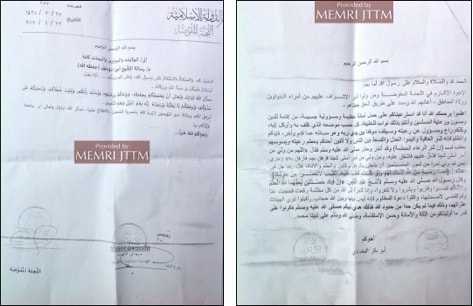 The
Delegated Committee's letter introducing Al-Baghdadi’s letter (left)
and Al-Baghdadi's letter to the Delegated Committee (right)
The
Delegated Committee's letter introducing Al-Baghdadi’s letter (left)
and Al-Baghdadi's letter to the Delegated Committee (right)
"Beware of oppression, for it [yields] a
bad outcome. Establish justice and equity among people, let me not find
one of you harming his subjects or governing them with violence, for [as
is said in a hadith] 'the worst of shepherds [leaders] are the
harsh ones.' The [Prophet Muhammad] warned and cautioned, saying 'Oh
Allah, whoever leads my nation and treats them harshly – treat him
harshly, and whoever leads my nation and treats them gently – be gentle
with him.' It is appropriate for one who leads the Muslim [nation?] to
comport himself with kindness, tenderness, clemency and moderation. Our
Lord said [in Quran 3:159]: 'So by mercy from Allah, [O Muhammad], you
were lenient with them. And if you had been rude [in speech] and harsh
in heart, they would have disbanded from about you.' And Allah's
Messenger told Al-Ashaj bin 'Abd Al-Qais: 'You have two qualities that
Allah loves: forbearance and patience.'
So guide, bring together, bring good
tidings and do not put people off. We renounce before Allah any act of
injustice which is covered up and not brought to us, and whose victims
are not given [justice].
"[As is said in a hadith]: 'Beware
the prayer of the oppressed, for there is no barrier between it and
Allah. Forgive righteous people their transgressions.' Your brother Abu
Bakr Al-Baghdadi."
Appendix II – Excerpts From The Delegated Committee's Memo On Takfir
The Delegated Committee's memo begins by stressing the centrality of the concept of monotheism (
tawhid)
in the Islamic faith: "Allah the Blessed and Exalted sent the Prophets
and Messengers to call their peoples to [embrace] monotheism, reject the
false gods of the earth, leave
jahiliyya, and fight the leaders
of unbelief until there is no more strife and religion is Allah's
alone." It mentions the Prophet Muhammad and the first caliphs as ideal
champions of monotheism, but says that after them, "monotheism declined,
and its traces were nearly wiped out and its lights were almost
extinguished... Despite this, the Prophet's promise that a fighting
Sunni group would remain [loyal to] the truth was realized, as he said:
'This religion shall continue to exist. A group of Muslims will keep
fighting for it until the Day of Resurrection.' This came [to be] when
Allah permitted the emergence of the state founded by the scholars and
leaders of the Najdi
da'wa [the Wahhabi scholars of the first
Saudi state], who fulfilled their obligation to Allah by fighting the
idolatrous worship of graves.
[15]
They called people to Allah with insight, with their tongues and their
spears. They published and compiled books, traveled through the land,
and called for monotheism and jihad. Their state maintained this
character for nearly 70 years...
"The Islamic State, may Allah glorify it
with monotheism, was established along the same lines, having put
forward tens of thousands of its sons to fight the idolatry of the
constitution
[16]
embodied by the global order which converged upon it from the east to
the west to fight it. Everyone knows that this State fights in order to
apply shari'a law and uproot the inferior man-made law... Everyone knows
that we acknowledge the heresy of the
tawaghit [false gods, tyrants] who legislate and those who elect them...
[17]
"This is what the Islamic State has called
for since its initial establishment by the sheikh Abu Mus'ab
Al-Zarqawi. It rejected the tawaghit of the land, their laws, their borders, their norms and their rituals. It waged war on polytheists of every kind: the rafidha
[Shi'ites], secularists and democrats, after pronouncing them to be
unbelievers and showing hostility to them. It also proclaimed to be
infidels all those who defend them, and today it continues to fight for
this cause, and is fought because of it..."
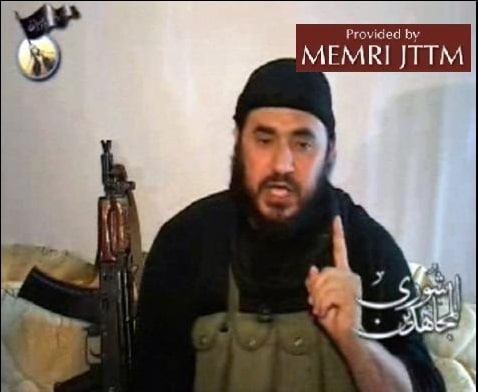 ISIS founder Abu Mus'ab Al-Zarqawi
ISIS founder Abu Mus'ab Al-Zarqawi
The document then presents statements by
Al-Zarqawi, Al-Baghdadi and ISIS's former spokesman Abu Muhammad
Al-'Adnani in which they set out their views on
takfir, and
declares: "This is the Islamic State's methodology, may Allah glorify it
with monotheism. As for statements that dilute the faith of
al-wala' wal-bara' [loyalty to Muslims and renouncement of non-Muslims] and bury [the ideal of]
millat Ibrahim[18] with the doubts of the people of
irja and
tajahum[19], or
[alternatively] the claims of the extremists who have strayed from the
religion as an arrow veers away from the bow – the [Islamic] State
renounces these [statements and claims]. No one is authorized to speak
in its name or attribute to it statements that it did not make. Its
stance is what was said by its leader [Abu Bakr Al-Baghdadi], may Allah
glorify him with monotheism, and his delegates [the Delegated Committee]
or its official spokesman. As for fabricating lies and making
capricious statements, this is speaking without knowledge, which Allah
forbade us to do..."
Elaborating on the two groups that ISIS denounces, the memo first addresses "the people of irja",
i.e., the group which espouses over-lenient positions and which
attributes these positions to ISIS: "The first type [of people we
denounce] are those who attribute to the Islamic State stances of irja
which contradict its [actual] methodology, or who claim that their own
[lax] positions are the positions of the Islamic State... Among them are
those who accept as Muslims [i.e., refrain from excommunicating] those
people who refrain from proclaiming the taghout [false gods, tyrants] of their country to be infidels, and those who treat the takfir
of [certain] polytheists as an obscure or controversial matter [rather
than a clear-cut issue]. Even worse, these people claim this to be the
Islamic State's [official] stance. This is a pure fabrication. Everyone
knows that the Islamic State has not hesitated for a single day to
acknowledge the heresy of polytheists, and that it regards this issue to
be one of the clear principles of the religion, which must be known [to
a Muslim even] before he knows [the rules of] prayer and other
religious obligations that are necessarily known... [emphasis added]"
Moving on to the second group – the
extremists – the memo says: "The second type [of people we denounce] are
those who defame [ISIS] and even accuse it of heresy because they are
influenced by the deviant innovations of the
Khawarij [20] or the Mu'tazila.
[21]
Some of them, ignorant of the beliefs of the people of Sunna, condemn
[ISIS simply] for espousing stances which are pure stances of the people
of Sunna. Others attribute to ISIS stances it never adopted...
"Among them are those who accuse [ISIS] of
heresy because they claim it allows committing explicit [acts of]
unbelief if this benefits the war [effort]. This is a lie. The explicit
belief of the Islamic State on this matter is that it is forbidden to
commit explicit [acts of] idolatry and unbelief, unless this is done
under duress...;
"[Also among these people are] those who
return to where they came from [i.e. leave ISIS territory] and renege on
their oath of allegiance [bay'a]. They return to the lands of
unbelief, citing the mistakes, shortcomings, negligence or oppression of
[ISIS] commanders as an excuse. This is the very essence of
[Khawarij-like] behavior... Did these deserters consider what they had
come to when they sought a land ruled by the laws of unbelief instead of
a land ruled by the laws of Islam and [chose to] live among the people
of unbelief and immorality rather than among the people of religion and
righteousness?...
"As for those who claim to be providing
'sincere advice' to the commanders in the form of slander, denunciation,
lies and desertion, which please no one but the enemies – namely the
infidels, the apostates and the hypocrites – the best that can be said
of them is that they are acting in contradiction to the Quran, violating
the Sunna, and shunning the path of the Salaf [the predecessors] with
regard to providing sincere advice to the commanders...
"Do these agitators who purport to be
reformers not know that obedience to the [rightful] authority in obeying
Allah is one of the foundations of the Sunni community?... The
boundaries of obedience are laid down by the shari'a, namely the
obligation to obey and submit to the leader in [all] matters that are
permitted,
[22]
whether one is strong or weary, in times of ease and in times of
hardship... As long as the leader's commands are compatible with [Islam]
he must be obeyed. [Even] if he commands something deplorable, he must
be obeyed. [Even] if he commands something that people abhor – he must
still be obeyed, since obedience applies whether people like [the
command] or hate it...
"The people of Sunna are patient with
their leaders, they provide them with sincere counsel and admonish them
discreetly. They do not seek to incite the general public and the
subjects against the leaders. They do not help the infidels against
their state and leaders. It is a well-known [fact] that mentioning the
shortcomings of the commanders and their mistakes in private or public
meetings leads to nothing but bad outcomes..."
Appendix III – Excerpts From Turki Al-Bin'ali's Response To The Delegated Committee's Memo
ISIS mufti Turki Al-Bin'ali's letter to
the Delegated Committee consisted of an introduction followed by 20
objections to the positions expressed in the memo. While it did not bear
an official logo, the letter is said to reflect the opinion of ISIS's
Center for Research and Studies, responsible for issuing papers on
religious matters.
[23]
In the introduction Al-Bin'ali presents
his reasons for writing the letter, most of them pertaining to the
religious duty of advising and counseling and fulfilling one's duty
toward the martyrs. The fifth reason cites the need to refrain from
playing into the hands of the extremists who criticize ISIS:
"[The Delegated Committee's memo on takfir]
exacerbated matters. The extremists on the Internet celebrated it. Some
of them delivered sermons from mosque pulpits, saying, 'Allah akbar!
Truth has appeared and falsehood has departed. Today the Islamic State
has repented and returned to the truth by saying that takfir is
among the clear principles of religion.' Some extremists on the Internet
said that 'this memo is a step forward. It compels Al-Baghdadi to renew
his Islam and repent his heresy,' Allah forbid [such talk]. Those who
follow the media of friends and foes alike will find that this memo gave
a green light to defame the Islamic State, may Allah glorify it with
monotheism. Dozens of brothers have informed us of this..."
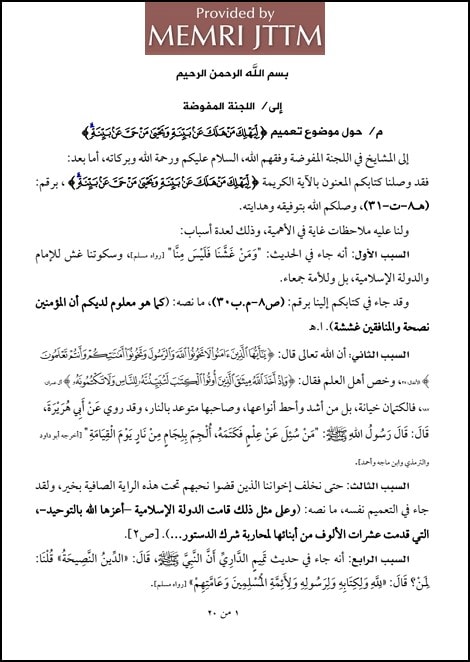 Al-Bin'ali's letter to the Delegated Committee
Al-Bin'ali's letter to the Delegated Committee
The following are excerpts from some of Al-Bin'ali's 20 objections:
-
"Why was a memo of this kind issued in such haste?...
-
"Why wasn't the memo shown to scholars fully versed [in Islam] –
which, praise Allah, are numerous? [For the sake of comparison,] Sheikh
Abu Muhammad Al-Furqan, may Allah have mercy on him, issued his
statement [the May 29, 2016 statement by the Central Office] only after
conducting 19 meetings with dozens of scholars, and even this statement
evokes criticism to this day... Moreover, we have been informed that the
author of the memo did not even consult the members of the Doctrinal
Committee – which was established to discuss such matters – such as
Sheikh Abu Muhammad Al-Masri, may Allah grant him success.
-
"Is it conceivable that the Caliphate State's memos and statements
should be reactions to pamphlets and audio messages circulated by the
extremists? The basic principle is that such matters should be published
in well-founded books, not in hasty memos that may contain mistakes and
errors, especially if they are meant for distribution among all the
soldiers...
-
"All the brothers I met recently noticed that the memo was
[apparently] published out of fear of the extremists' recklessness... As
evidence they pointed to the fact that this memo contradicted the
statement of Sheikh Abu Muhammad Al-Furqan, may Allah accept him...
This... is unlike what we have come to expect of our sheikhs and leaders
since the establishment of the Islamic State, may Allah glorify it,
[namely a stance that] does not fear the reproach of critics...
-
"Why [was a memo addressing] such sensitive matters published with
the second most important seal in the Islamic State, inferior only to
that of the Imam [Al-Baghdadi], may Allah glorify him?..." Al-Bin'ali
goes on to explain that, if the memo had been issued by a lesser
authority, such as the Doctrinal Committee, for example, correcting its
errors would have been less problematic. He adds that the style of the
memo, the legal argumentation and the way it proceeds from one thought
to the next [all] indicate that it was prepared by Abu Zaid Al-Iraqi
(this is apparently the kunya of a senior member of ISIS's leadership, whom Al-Bin'ali does not hold in high regard as a scholar).
-
"How can a weak, inadequate, hadith be used to prove such grave matters, without [presenting] any correct hadiths?
[This is] especially [puzzling] given that this memo was issued by the
[body directly] subordinate to the Imam [Al-Baghdadi, i.e. the Delegated
Committee]." Al-Bin'ali goes on to discredit several hadiths mentioned in the Delegated Committee's memo.
-
"In memos and statements of this sort that address the most profound
religious matters, it would have been possible to avoid many grammatical
mistakes by showing them to competent scholars who would edit them, and
[such scholars] are numerous, praise Allah...
-
"The following is the most important remark: How could the memo be
issued with such an obvious contradiction? The memo contradicts what was
firmly established in sheikh Abu Muhammad Al-Furqan's statement [i.e.,
the Central Office's Statement No. 155, from May 29, 2016], in which he
said that 'the claim that declaring the heresy [of those who refrain
from excommunicating others] is a principle of religion involves an
invalid interpretation [of the shari'a]...' Then along comes this memo
and says explicitly that 'the Islamic State... regards the issue of
proclaiming the heresy of polytheists to be one of the clear
principles of the religion...' One can either speak of 'principles of
religion' or of 'clear issues.' But [the memo] combined the two,
producing a new position that contradicts the previous statement [by
Al-Furqan] and goes farther than the position of the extremists
themselves."
Explaining the basic problem he identifies in the Delegated Committee's memo, Al-Bin'ali argues that regarding takfir as a clear principle of the religion leads to an endless chain of takfir:
"A clear principle of religion is something that is known prior to the
Prophetic proof [i.e., an elementary theological concept known to
mankind even before and regardless of the revelation of holy scripture].
This means that [two sinners] – one who says that another god exists
besides Allah and one who refrains [from takfir, i.e., from
proclaiming the heresy of one who is guilty of it] – are on the same
level. The implication of this is that a person who refrains [from takfir]
has violated one of 'the clear principles of the religion,' and
therefore he [himself] is a polytheist who cannot be excused on [the
grounds of] ignorance or according to any interpretation. The same goes
for a second person who refrains [from proclaiming takfir against
the first person], since he too has violated one of the clear
principles of religion, and the same goes for the third, fourth, and
one-hundredth, until one is forced to proclaim takfir against oneself..."
To
underscore his point, Al-Bin'ali says that the Delegated Committee's
position would force ISIS members to proclaim even ISIS founder Abu
Mus'ab Al-Zarqawi and his successors to be unbelievers, since they
accepted as Muslims certain scholars who ISIS now regards as heretics.
He adds: "We have not seen a single scholar of the Islamic State, may
Allah glorify it with monotheism, either among those who died or among
those who are still alive, who says that takfir is one of the clear principles of religion"...
-
"The author of the memo asserted that the Islamic State, may Allah
glorify it with monotheism, does not believe that 'as a rule, people in a
[country] that has recently become part of the Abode of Unbelief[24] [dar al-kur al-tari']
are considered Muslims,' and that attributing this position to ISIS is a
lie and slander. This is a rash assertion, because whoever is familiar
with the Islamic State's actions since its establishment knows that it
targets only those whose heresy and unbelief have been proven."
Al-Bin'ali quotes statements by Abu Mus'ab Al-Zarqawi and Abu Muhammad
Al-'Adnani which clearly indicate that they regarded the Sunnis of Syria
and Iraq as Muslims.
-
"The author of the memo... did not denounce the [above] assertion –
that 'as a rule, people in a [country] that has recently become part of
the Abode of Unbelief are considered unbelievers' – although [denouncing
it] is necessary as a part of refuting the extremists' [claims]. One of
the extremists' basic tenets is that [these people] are considered
unbelievers. This is an invalid principle, as the mujahid sheikh Abu
Muhammad Al-'Adnani pointed out..."
Al-Bin'ali concluded his remarks:
"In sum, we have written these lines
containing the most important remarks and comments, and we place them
before the sheikhs of the Delegated Committee, may Allah grant them
success, in hope that they consider them carefully and correct what they
must correct... especially since the correctness and clarity of creed
are among the most important prerequisites for victory...
"It is imperative to fix this great error,
which we believe is a [mere] slip of the pen, Allah willing...
especially considering that this error was published in the name of the
Delegated Committee, and therefore thousands of Muslims worldwide might
adopt it. The mistake of the scholar is the mistake of the whole world,
as the saying goes. Remember that you will stand before Allah on the Day
of Resurrection, when neither titles nor positions of power [have any
meaning]."
[1] Deirezzor24.net, June 4, 2017.
[3]
The Delegated Committee is ISIS's top executive body, which assists the
organization's leader in supervising its regional branches (or
"provinces") as well as the departments (
dawawin) and committees in charge of finances, recruitment, military procurement, etc. See:
ISIS Video Sets Out Structure Of Caliphate State, July 5, 2017.
[4]
It should be mentioned that two versions of the letter have been
circulated by ISIS supporters online. One bears no legible date but is
accompanied by a letter from the Delegated Committee dated April 22,
2017. The second bears Al-Baghdadi's seal and is dated May 1, 2017. In
any case, the letter was circulated by the Delegated Committee several
weeks before it issued its memo. Elfagr.org, May 6, 2017;
Rudaw.net/arabic, May 15, 2017; Dawaalhaq.com, May 16, 2017.
[5]
Some ISIS supporters on Facebook claimed that Al-Baghdadi had been
actively involved in drafting the memo and had personally approved it.
[7] Telegram.me/Al-Dawla Al-Islamiyyah, May 19, 2017;
Al-Naba 82, May 25, 2017, p. 15;
Rumiyah 10, June 8, 2017, pp. 12-14.
[9] Al-Naba' 85, June 15, 2017, p. 12.
[10] See JTTM report
In
First Audio Message, Released Day Prior To Widespread Attacks
Throughout Iraq, ISI Leader Abu Bakr Al-Baghdadi Says ISI Is Alive And
Well, Threatens U.S. And Shi'ites, July 24, 2012. It should be noted
that, regardless of Al-Baghdadi's public statements, there was no love
lost between ISIS and Al-Libi, who was a fierce critic of Al-Baghdadi's
organization, as evident from internal Al-Qaeda correspondence uncovered
by the US military. By denouncing him in
Al-Naba, ISIS was not only signaling a certain shift in its ideology but also settling an old score.
[11]
Al-Bin'ali was killed in an airstrike in Syria, near Al-Mayadeen, on
May 31. See twitter.com/CJTFOIR, defense.gov, June 20, 2017.
[12] Al-Bin'ali's letter was circulated via Telegram channels and Twitter. See e.g., twitter.com/foovpic, June 29, 2017.
[13]
The letter is unsigned, but Abu 'Abd Al-Barr Al-Salehi's students have
attributed it to him and to his teacher Abu Al-Nassar, both of them ISIS
clerics of Kuwaiti origin. Telegram.me/Andad Ahbab, July 14, 2017.
[14] Based on Quran 75:13.
[15] Referring to the first Saudi state and the early Wahhabis' campaign against Sufism and the veneration of saints' tombs.
[16]
Referring to modern regimes, which the jihadis consider antithetical to
the Islamic faith. In Arabic the phrases "idolatry of graves" and
"idolatry of the constitution" rhyme:
shirk al-qubour and
shirk al-dustour.
[17] Taghout, pl.
tawaghit:
lit. false god, idol. In jihadi parlance this usually refers to rulers
and administrations that do not apply shari'a law but rather "man-made"
laws, which the jihadis consider an act of heresy.
[18] Millat Ibrahim
– the religion of Abraham – in Salafi-jihadi discourse this refers to
the obligation to renounce polytheism and disassociate from polytheists.
[19] Tajahum or
jahmiyya – a
pejorative applied by radical Salafis to the more moderate ones. The
term refers to an early Islamic theologian, Jahm Ibn Safwan, who argued
that no Muslim has the ability to judge the quality of another's faith,
for only Allah can see what is in people's hearts.
[20]
Khawarij/Kharijites – an early Islamic sect that advocated
excommunicating Muslims even for minor sins and was proclaimed heretical
by the mainstream Sunna. Today the term is used to brand Muslims groups
as extremist, and is often applied to ISIS itself and to other
Salafi-jihadi groups by their critics in the Muslim world.
[21] Mu'tazila – a school of Islamic philosophy and theology which was prominent during the 8
th
century. Following Hanbali scholars and Ibn Taymiyya, Salafis consider
the Mu'tazila to be heretical, inter alia due to their belief that
Muslims who are guilty of major sin are sentenced to hell for eternity, a
position which Ibn Taymiyya considered to be very similar to that of
the Kharijites.
[22]
This refers to the Islamic principle that the rightful leader of the
Muslims must be obeyed under all circumstances, unless obeying him
involves committing clear acts of heresy.
[23] For a discussion of Al-Bin'ali's letter, see:
http://www.muslm.org/vb/showthread.php?567880-%CD%CF%ED%CB-%DA%E4-%D5%CF%E6%D1-%D1%CF-%E3%E4-%E1%CC%E4%C9-%C7%E1%C8%CD%E6%CB-%E6%C7%E1%CF%D1%C7%D3%C7%CA-%DA%E1%EC-%C7%E1%E3%DD%E6%D6%C9-%E6%C7%D3%CA%DE%D1%C7%D1-%C7%E1%CF%E6%E1%C9-%DA%E1%EC-%DE%E6%E1-%C7%E1%C8%E4%DA%E1%ED
http://www.muslm.org/vb/showthread.php?567877-%D9%87%D9%84-%D9%81%D9%8A-%D8%A8%D9%8A%D8%A7%D9%86-%D8%A7%D9%84%D9%84%D8%AC%D9%86%D8%A9-%D8%A7%D9%84%D9%85%D9%81%D9%88%D8%B6%D8%A9-%D8%BA%D9%84%D9%88-%D8%9F%D8%9F%D8%9F%D8%9F
[24] There is a debate among Salafi theologians as to whether residents of
dar al-kufr al-tari'
– i.e. countries that were originally subject to shari'a law (and were
therefore considered part of the Abode of Islam) but are no longer
subject to this law (and are therefore considered to be part of the
Abode of Unbelief) – should be considered Muslims by default, or not.
R. Green
Source: https://www.memri.org/reports/dispute-over-takfir-rocks-isis
Follow
Middle East and Terrorism on
Twitter
Copyright - Original materials copyright (c) by the authors.











